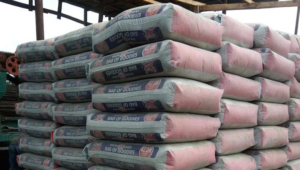Price of Cement In Nigeria – The word “cement” comes from an old Roman word used to describe masonry resembling modern concrete. This concrete was made from crushed rock with burnt lime as binder.
The volcanic ash and pulverized brick supplements that were added to the burnt lime to obtain a hydraulic binder were later referred to as cementum, cimentum, cement, and cement. In modern times, organic polymers are sometimes used as cement in concrete.

Cement is simply a sticky substance used in buildings. It is that substance that helps materials like sand and gravel stick together. When cement mixes with fine sand, it makes mortar for building walls. If you mix it with sand and gravel, it produces concrete, which is used a lot in construction.
As builders deal with changes in the market and money problems, it’s really important to know the current cement prices.
Here’s a breakdown of the retail and wholesale prices for popular cement brands:
Retail Prices (per 50kg bag):
| Cement Brand | Quantity | Price |
|---|---|---|
| Dangote Cement | 50kg | ₦7,500 |
| BUA Cement | 50kg | ₦7,600 |
| Elephant/Lafarge | 50kg | ₦7,400 |
| Ibeto | 50kg | ₦7,500 |
| White Portland Cement | 5kg | ₦3,200 |
| POP Cement | 40kg | ₦9,000 |
Wholesale Cement Prices (Trailer) in Nigeria Today
| Cement Brands | Prices (per trailer load) |
|---|---|
| Dangote Cement | ₦4,800,000 |
| Lafarge Cement | ₦4,240,000 |
| BUA Cement | ₦4,120,000 |
| Elephant Cement | ₦4,240,000 |
| Ashaka Cement | ₦4,240,000 |
Price of Cement in Nigeria By States and FCT Today.
| State | Price Range | Size (kg) |
|---|---|---|
| Abia | ₦8,500 – ₦10,000 | 50kg |
| Adamawa | ₦8,500 – ₦10,000 | 50kg |
| Akwa Ibom | ₦8,500 – ₦10,000 | 50kg |
| Anambra | ₦8,500 – ₦10,000 | 50kg |
| Bauchi | ₦8,500 – ₦10,000 | 50kg |
| Bayelsa | ₦8,500 – ₦10,000 | 50kg |
| Benue | ₦8,500 – ₦10,000 | 50kg |
| Borno | ₦8,500 – ₦10,000 | 50kg |
| Cross River | ₦8,500 – ₦10,000 | 50kg |
| Delta | ₦8,500 – ₦10,000 | 50kg |
| Ebonyi | ₦8,500 – ₦10,000 | 50kg |
| Edo | ₦8,500 – ₦10,000 | 50kg |
| Ekiti | ₦8,500 – ₦10,000 | 50kg |
| Enugu | ₦8,500 – ₦10,000 | 50kg |
| Gombe | ₦8,500 – ₦10,000 | 50kg |
| Imo | ₦8,500 – ₦10,000 | 50kg |
| Jigawa | ₦8,500 – ₦10,000 | 50kg |
| Kaduna | ₦8,500 – ₦10,000 | 50kg |
| Kano | ₦8,500 – ₦10,000 | 50kg |
| Katsina | ₦8,500 – ₦10,000 | 50kg |
| Kebbi | ₦8,500 – ₦10,000 | 50kg |
| Kogi | ₦8,500 – ₦10,000 | 50kg |
| Kwara | ₦8,500 – ₦10,000 | 50kg |
| Lagos | ₦8,500 – ₦10,000 | 50kg |
| Nasarawa | ₦8,500 – ₦10,000 | 50kg |
| Niger | ₦8,500 – ₦10,000 | 50kg |
| Ogun | ₦8,500 – ₦10,000 | 50kg |
| Ondo | ₦8,500 – ₦10,000 | 50kg |
| Osun | ₦8,500 – ₦10,000 | 50kg |
| Oyo | ₦8,500 – ₦10,000 | 50kg |
| Plateau | ₦8,500 – ₦10,000 | 50kg |
| Rivers | ₦8,500 – ₦10,000 | 50kg |
| Sokoto | ₦8,500 – ₦10,000 | 50kg |
| Taraba | ₦8,500 – ₦10,000 | 50kg |
| Yobe | ₦8,500 – ₦10,000 | 50kg |
| Zamfara | ₦8,500 – ₦10,000 | 50kg |
| Abuja | ₦8,500 – ₦15,000 | 50kg |
CONCLUSION
Cement plays a vital role in Nigeria’s building/ construction sector, determining the strength and stability of buildings. This comprehensive overview provides insights for stakeholders and workers in the construction and building industry across Nigeria.